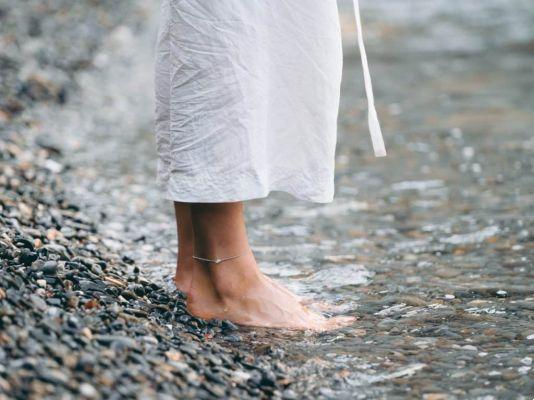Throughout history, women have not been understood as human beings. They were seen as objects that could give men pleasure and fulfill other types of demands they had, such as keeping the house in order.
Because of this, it took a long time to investigate with attention and respect the functioning of the female body. This neglect led to women who never reached an orgasm, who never understood their own organism and who still suffered intense misogyny just for menstruating.
Although, for a period, menstruation was the subject of land fertilization rituals, presenting a positive image, after 200 BC everything changed. In Ancient Greece, for example, the idea spread that a menstruating woman could bewitch other people with her gaze, because it was inexplicable that she bled for so many days without dying.

Surrounded by mysteries, then, menstruation became something that women should hide from society, as well as sexuality itself. Furthermore, this view was further aggravated by the Bible, for which the woman is biologically unclean for having fed on the forbidden apple.
In the Dark Ages, during the Middle Ages, women who bled were considered witches, who could threaten the hegemony of the Catholic Church. Society also understood that menstruation was something demonic, which needed to be contained. As a result of this, many women were killed at stakes.
Fortunately, with the advancement of time, we have more tools to understand how the female body works. No woman will be burned for menstruating, for example, but some myths still surround this topic. Then spread the truth about each of them!
TPM does not exist
Acronym for Premenstrual Tension, PMS is caused by a series of processes that happen in the body of those who menstruate. Symptoms include irritation, sadness, cramping, breast tenderness, mood swings, and other pain. This all happens due to the hormonal changes of the menstrual cycle.
In fact, in some cases these changes can be so intense that they lead to the development of a premenstrual dysphoric disorder, characterized as a serious picture of monthly depression, so PMS exists and must be monitored carefully!
Contraceptives cause infertility
Although birth control pills are primarily used to prevent a pregnancy from developing, there are other functions they perform. Relief of menstruation symptoms is one of them, as well as the treatment of some problems in the uterine region.
The contraceptive is a concentration of hormones that suspend the menstrual cycle while it is ingested. If a person stops taking the pill, the menstrual cycle will automatically reoccur in her body, and there is a possibility that she will become pregnant. Therefore, contraceptives do not cause infertility.
We can't wash our menstruating hair
In the past, it was believed that washing your hair during menstruation could increase blood flow during this period. In severe cases, it would result in bleeding, but this is just a big myth.
The menstrual cycle and menstruation are not related to the process of washing hair. There is no scientific study that proves this or any indication that would lead to the need to carry out an investigation on the subject.
We don't menstruate when we're in the pool
Many women may have noticed that when entering the pool or the sea, menstrual bleeding seems to have stopped, however no water has the potential to stop menstruation, as if it had already ended.
In fact, what happens is that the water exerts pressure on the vagina, suspending the power of gravity on it, so it is more difficult for blood to go down the vaginal canal in that environment. But when leaving the water it is likely that the liquid will drain again. So we keep menstruating when we're in the pool.
Tampons break the hymen of virgin women
The hymen is a thin membrane that is located at the entrance to the vaginal canal. While it's not very strong, it's not that fragile either. By the way, it can form in different ways in each woman, presenting different characteristics in each one.
Before joining this information to tampons, we need to understand what virginity is. According to patriarchal society, this heteronormative concept defines penetration of the penis into the vagina. After this happens for the first time, then, a woman and a man would cease to be virgins.
There are, however, many ways to have sex that do not involve the penetration of the penis or an object into the vagina. Therefore, a woman can develop a sex life and never have her hymen broken. Faced with a sexist conception, she would still be a virgin. But from the point of view of sexuality, she would no longer be.
You may also like
- Know what you should eat and avoid during menstruation
- Analyze the cause of menstrual cramps in Body Language
- Understand if dark period is a danger sign
- Planting the Moon: a ritual every woman should know
Considering this scenario, it would be more correct to question whether tampons break the hymen of women, whether they are virgins or not. And the answer to that is no. Because they are small and easy to insert into the vaginal canal, this type of absorbent is not able to break the membrane called the hymen.
Having a heavy flow causes anemia
It is not entirely wrong to believe that a heavy menstrual flow can cause anemia, however this is only a possibility in certain cases and not something that will definitely happen when you start menstruating.
The most common causes of anemia are blood loss, parasite infections, lack of nutrients and other illnesses, meaning menstrual blood loss can make a person more susceptible to developing the condition. That's why it's essential to perform monthly exams to check if the body is working normally.
We can't go barefoot while we're menstruating
It was long believed that cold ground touching a person's feet could intensify menstrual cramps. Just like the ban on washing hair during menstruation, this is just a myth.

Cramping is a contraction of the uterus, which has nothing to do with another part of the female body or the temperature of the ground someone is standing on. That means you can walk around barefoot if you're on your period, no problem.
Menstruation is toxic and dirty
Menstrual blood is seen as dirty, toxic and impure. Many even imagine that it has a bad smell and that, therefore, it is disgusting. But this is another myth that began to be spread in antiquity and remains to this day.
Menstruation is a natural process of the female body, characterized by the shedding of the uterus that is accompanied by bleeding. In contact with air, the blood begins to oxidize, but this does not cause a bad smell. Normally, the odor is the result of the proliferation of fungi and bacteria provided by the external absorbent.
From all the information presented, it is observed that menstruation does not deserve the negative fame associated with it in the Middle Ages. In fact, it is part of a natural cycle of the female body that we must pay attention to. The more you know your body, the more immune you will be to the misogynistic and misguided myths that surround your blood.

























